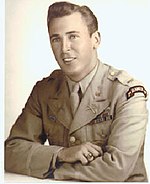Leonard Lomell, Date of Birth, Place of Birth, Date of Death
TweetLeonard Lomell
U.S. Army soldier and attorney
 Date of Birth: 22-Jan-1920
Date of Birth: 22-Jan-1920
 Place of Birth: Brooklyn, New York, United States
Place of Birth: Brooklyn, New York, United States
Date of Death: 01-Mar-2011
Profession: lawyer, businessperson
Nationality: United States
Zodiac Sign: Aquarius 
About Leonard Lomell
- Leonard G.
- "Bud" Lomell (January 22, 1920 – March 1, 2011) was a highly decorated former United States Army Ranger who served in World War II.
- He is best known for his actions in the first hours of D-Day at Pointe du Hoc on the coast of Normandy, France.
- Pointe du Hoc was the site of the German Army's largest coastal weapons, five 155-millimeter German guns with a 25-kilometer range that endangered the tens of thousands of troops landing on Omaha Beach and Utah Beach, and thousands of watercraft in the English Channel supporting the Normandy invasion.
- Unbeknownst to the Allied intelligence, the Germans had concealed the guns in an orchard, but left them operational and ready to fire.
- Through skill, courage and "pure luck," Lomell found and quickly disabled all five guns.
- Lomell was recognized by historian Stephen Ambrose as the single individual — other than Gen.
- Dwight D.
- Eisenhower — most responsible for the success of D-Day.
- Six months later, in the Battle of Hürtgen Forest, he would again distinguish himself, earning a Silver Star for his heroism and leadership as the 2nd Ranger Battalion captured and held Hill 400.
- After the war he returned to Ocean County, New Jersey, becoming an attorney in Toms River.
Read more at Wikipedia
See Also
- Famous People's Birthdays on 22 January, United States
- Famous People's Birthdays in January, United States
- Famous lawyer's Birthdays on 22 January, United States
- Famous lawyer's Birthdays in January, United States
- Famous businessperson's Birthdays on 22 January, United States
- Famous businessperson's Birthdays in January, United States

